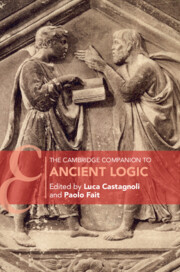Book contents
- The Cambridge Companion to Ancient Logic
- Other Volumes in the Series of Cambridge Companions
- The Cambridge Companion to Ancient Logic
- Copyright page
- Contents
- Contributors
- Introduction
- I The Development of Logic in Antiquity
- II Key Themes
- 5 Truth as a Logical Property and the Laws of Being True
- 6 Definition
- 7 Terms and Propositions
- 8 Validity and Syllogism
- 9 Demonstration
- 10 Modalities and Modal Logic
- 11 Fallacies and Paradoxes
- 12 Logic in Ancient Rhetoric
- 13 Ancient Logic and Ancient Mathematics
- III The Legacy of Ancient Logic
- Bibliography
- Abbreviations
- Index of Passages
- General Index
- Other Volumes in the Series of Cambridge Companions
5 - Truth as a Logical Property and the Laws of Being True
from II - Key Themes
Published online by Cambridge University Press: 29 April 2023
- The Cambridge Companion to Ancient Logic
- Other Volumes in the Series of Cambridge Companions
- The Cambridge Companion to Ancient Logic
- Copyright page
- Contents
- Contributors
- Introduction
- I The Development of Logic in Antiquity
- II Key Themes
- 5 Truth as a Logical Property and the Laws of Being True
- 6 Definition
- 7 Terms and Propositions
- 8 Validity and Syllogism
- 9 Demonstration
- 10 Modalities and Modal Logic
- 11 Fallacies and Paradoxes
- 12 Logic in Ancient Rhetoric
- 13 Ancient Logic and Ancient Mathematics
- III The Legacy of Ancient Logic
- Bibliography
- Abbreviations
- Index of Passages
- General Index
- Other Volumes in the Series of Cambridge Companions
Summary
In a passage from his New Essays on Human Understanding (4.5.3–11) Leibniz distinguishes between three kinds of truth: propositional, moral, and metaphysical. Propositional truth belongs to true affirmations and negations, and consists in ‘correspondence of the propositions which are in the intellect with the things they are about’. Moral truth or truthfulness consists in ‘talking about things in accordance with the belief of our spirit’. Finally, metaphysical truth ‘is the real existence of things, in conformity with the ideas which we have about them’ and ‘is typically interpreted by metaphysicians as an attribute of being’. In ancient Greek we can find a similar tripartition of the meanings of the noun alētheia and the adjective alēthēs, which at least from the classical age (fifth–fourth century BCE) prevailed over the other terms adopted in the rich Homeric vocabulary for truth. Therefore, in ancient Greek there are three possible meanings of alētheia: (1) truth as opposed to falsehood (pseudos), (2) truthfulness as opposed to lying, and (3) reality as opposed to appearance. The first meaning is what I will call ‘logical truth’ (obviously not in the sense of ‘logical tautology’) and is an attribute of declarative sentences and of the beliefs that they express. The second meaning, moral truth, applies in particular to people, but also to oracles or dreams; in the case of people it is the ethical virtue of those who are sincere in their discourses (en tois logois),2 namely, of those who say what they believe without hiding anything, and is opposed to the moral vice of lying, which belongs to those ‘who hide something in themselves and declare something else’.3 Finally, there is reality as opposed to appearance, which Leibniz calls ‘metaphysical truth’ and which I prefer to call, faute de mieux, ‘ontological truth’; I distinguish this both from Leibniz’s definition and from the definition of it as an attribute of being given by the metaphysicians of Leibniz’s time and later by Heidegger, which Leibniz considered to be ‘a useless and almost senseless attribute’. By ‘ontological truth’ I will thus mean the attributive use of the adjective ‘true’, as applied ‘to each object, if one wants to express that it really is what it should be according to the name given to it’.4
- Type
- Chapter
- Information
- The Cambridge Companion to Ancient Logic , pp. 109 - 127Publisher: Cambridge University PressPrint publication year: 2023



